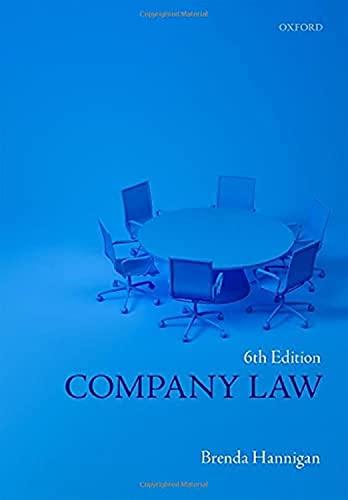Question
1. A and B agree to a deal in which A would sell the rights to his popular song Pop Around the Clock to B
1. A and B agree to a deal in which A would sell the rights to his popular song "Pop Around the Clock" to B for $100 million, to be paid in $5 million annual installments over a 20-year period. He wants his daughter to get the remaining payments five years later. What kind of legal standing does A's daughter have?
A) She is an intended third party beneficiary and entitled to the monies
B) She is an assignee and is entitled to the money even though she did not furnish any consideration
C) She is an obligor because she is obligated to accept the money
D) None of the above
2. Adam engages Bruce to manage Adam's retail business. Bruce has the implied authority to do all of the following, except:
A) Purchase inventory for Ace's business.
B) Sell Ace's headquarters and business.
C) Pay Ace's business debts.
D) Hire or discharge Ace's business employees.
3. Nancy says she is Vivian's representative. Vivian doesn't know Nancy and is unaware that she is acting in such a way. Vivian is required to pay $500 for 500 pairs of gloves from Hand Vendors, Inc., according to a contract that Nancy, posing as Vivian's agent, acquires. The most effective approach for Vivian to formally accept the deal would be to:
A) By showing apparent authority
B) By ratifying the contract that Alice made
C) By implication
D) By quasi-contract
4. Susan strikes Trixie, a pedestrian, by mistake as she is driving. The speed limit was being exceeded by 15 miles by Susan. Which one of the following statements is true?
I. Susanowed Trixie a duty of care, and her actions fell short of that standard.
II. The collision was caused by Susan's decision to drive 15 miles per hour over the speed limit.
III. Since Trixie was a pedestrian, Susanowed no duty of care to her.
A) I only
B) I and II
C) I and III
D) II and III
5. A and B agree on a purchase agreement for silk. B violates the agreement. Because he is unable to create scarves for five of his biggest clients as a result of the breach, A loses business. Are B's such losses recoverable?
A) No, not in any case.
B) Yes, but only if they are foreseeable to the breaching party.
C) No, because these are in violation of public policy to mitigate damages.
D) Yes, because merchants can sue non-merchants for lost profits in personal services contracts.
6. Which of the following calls for a general partnership's dissolution?
I. A partner quits the partnership even though his partnership agreement still has one year to go.
II. Because the partnership is ad hoc, two of the three partners may opt to dissolve it.
III. Despite having two years left on her partnership agreement, a partner is requested to depart the company.
A) I and II
B) I, II and III
C)II and III
D)None of these circumstances would require a dissolution.
7. Which of the following is correct?
A) A general partner shares profits and losses, and is personally liable for the losses, if the partnership cannot pay from its assets.
B) A general partner must share profits and losses in the same manner and has unlimited liability for losses.
C) A person can be a general partner if she does not share in the profits, but gets paid a monthly salary.
D)If a person shares in the profits of the business, she must share those profits equally with other general partners to be legally regarded as a partner.
8. Which of the following are characteristics of a "close" corporation?
I. Its shares are not bought and sold by the public at large
II. The officers and directors may be the same
III. It must comply with the registration requirements of the Securities Act of 1934
A) I and II only
B) I and III only
C) II and III only
D) I, II and III
9. The general partners of Belch Company are A, B, and C. The partnership deals in the purchase and sale of land in Andy Park, New Hampshire. Although profitable in the past, Andy Park real estate sales have been impacted by the economic crisis. Partner B paid around 20% more than fair market value for a piece of real estate that the partnership owned and sold to partner X. Then X gave B a $10,000 "gift." Which of the following statements is true? i. Partner B can keep the $10,000 because he was able to sell the land in an economic downturn for a substantial profit ii. Partner B can keep a portion of the $10,000 representing the profits earned iii. Partner B must relinquish the entire amount to Partners A and C
A) I only
B) II only
C) III only
D) I and II
10. Which of the following situations will result in apparent authority?
I.A contract made by a former agent with a third party who previously deal with this agent and did not know that the agency expired.
II. A contract made on behalf of a principal with a third party by someone claiming to be an agent, but completely unknown to the principal.
III. A contract made by an agent with express authority which flows from that authority.
A) I only.
B) I and II.
C) I and III.
D) I, II and III.
Step by Step Solution
There are 3 Steps involved in it
Step: 1

Get Instant Access to Expert-Tailored Solutions
See step-by-step solutions with expert insights and AI powered tools for academic success
Step: 2

Step: 3

Ace Your Homework with AI
Get the answers you need in no time with our AI-driven, step-by-step assistance
Get Started


